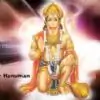maa nishaada pratishthaam tva
maagamah shaashvateeh samaah
yat krauncha mithunaat ekam
avadheeh kaama mohitam
Word translations:-
maa nishaada - O hunter
pratishthaamtva - good reputation
maagamah - not get
shaashvateeh samaha - for several years
yat - because
krauncha mithunaat - out of the kranucha pair
ekam - one
avadheeh - you killed
kaama mohitam - filled with amorous feelings
Thus the verse translates as: -
O Nishad, may you not get any good reputation (or may you get ill-reputation) for several years because, out of the pair of kraunch birds, you killed one, when it was full of amorous feelings.
Valmiki uttered this as a curse. But it became a beautiful verse with perfect metric composition. This verse could be sung beautifully on a stringed musical instrument. Valmiki was amazed at the beauty of the composition. He called it shloka because he uttered it out of shoka (grief). But at the same time he was feeling bad that he cursed somebody.
Lord Brahma arrived there and told Valmiki to compose the life-story of Rama, treating that shloka as the basis. But how could a curse be considered as the basis for a sacred compositon like Ramayan?
To know the answer, we should see another meaning of the shloka.
Word translations
maa - mother (specifically Laxmi)
nishaada - place of residence
pratishthaam - good reputation
tvam - you
aagamah - get
shaashvateeh samaha - for several years
yat - because
krauncha - kutil (crooked)
mithunaat - out of the pair
ekam - one
avadheeh - you killed
kaama mohitam - filled with lust
As we see above, maa means mother Laxmi and nishaada means place of residence. Mother Laxmi resides in the heart of Lord Vishnu. Thus maa-nishaada means Laxmipati or Vishnu.
The word maa can also be used for mother Sita. Thus maa-nishaada may also mean Lord Ram.
Thus the translation of the shloka becomes: -
O Vishnu/Ram, may you get reputation for several years because, out of the couple (Ravan and Mandodari), you killed the crooked (Ravan), who was filled with lust.
As you can see, one meaning of the shloka is a curse and another is glorification to Lord Ram.😊






























